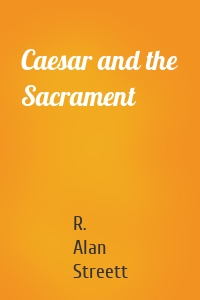R. Alan Streett
2 кн.
Subversive Meals
Subversive Meals examines the Lord's Supper within the sociopolitical context of first-century Roman domination, and concludes that it was an anti-imperial praxis. Although the Christian communal meal looked much like a typical Roman banquet in structure, with a deipnon and a symposion, it was essentially different. The Roman meal supported the empire's ideology, honored Caesar and the gods, reinforced stratification among the masses, and upheld Rome's right to rule the world....
| Автор | R. Alan Streett |
Caesar and the Sacrament
When the earliest Christ-followers were baptized they participated in a politically subversive act. Rejecting the Empire's claim that it had a divine right to rule the world, they pledged their allegiance to a kingdom other than Rome and a king other than Caesar (Acts 17:7). Many books explore baptism from doctrinal or theological perspectives, and focus on issues such as the correct mode of baptism, the proper candidate for baptism, who has the authority to baptize, and whether or not...
| Автор | R. Alan Streett |



